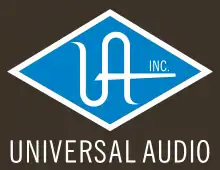 | |
| Type | Privately held company |
|---|---|
| Industry | Pro Audio |
| Founded | 1999 |
| Founder | Bill Putnam, Jr. and Jim Putnam |
| Headquarters | , |
| Products | Audio signal processing hardware and digital signal processing software |
| Owner | Bill Putnam, Jr. |
| Website | http://www.uaudio.com/ |
Universal Audio is an American company that designs, imports, and markets audio signal processing hardware and effect pedals, audio interfaces, digital signal processing, virtual instrument, and digital audio workstation software and plug-ins.
Founded in 1958 by Bill Putnam, Sr. with products produced under the Universal Audio brand through the mid-1970s, the company was re-established in 1999 by his sons Jim and Bill Putnam, Jr.. The company produces modern versions of vintage Universal Audio, UREI, and Teletronix analog recording equipment, as well as hardware and software for digital recording on the UAD-2 platform.[1]
History
Original Company
Universal Audio, Inc. was founded alongside the United Recording Corporation by Bill Putnam Sr. in 1958. Putnam’s intention was for Universal Audio to serve as United’s manufacturing arm, with the company initially operating out of the United Recording premises at 6050 Sunset Boulevard in Hollywood, California. During its first few years, Universal Audio produced a number of tube-based audio processors, the most famous being the 610 preamplifier.[2] These processors also served as components in custom recording consoles built by Universal Audio for various studios.[3]
In 1961, United Recording acquired Studio Supply Co. and rebranded it as the Studio Electronics Corporation (SEC). The focus of SEC was the creation of fully-fledged studio systems built around the equipment produced by Universal Audio. In October 1961, all manufacturing was moved to Western Recorders, a nearby company in which United Recording had gained a majority stake.[4]
While Universal Audio as a company was eventually absorbed by Studio Electronics in December 1965, the brand itself continued with individual products retaining the Universal Audio label. This merger also coincided with another relocation, this time to an 8,100 square foot premises at 11922 Valerio Street in North Hollywood.[5]
Studio Electronics acquired two additional brands in 1967: Teletronix and Waveforms. The acquisition of Teletronix from Babcock allowed SEC to begin production of the popular LA-2A compressor.[6] Waveforms on the other hand expanded the product catalog into the area of precision audio test instruments.[7] In light of these acquisitions, and anticipation of more, SEC was rebranded as United Recording Electronics Industries (UREI). Products would continue to carry their own brand names alongside the UREI badge until the mid-1970s, at which point the Universal Audio label was removed from Revision H of the 1176 compressor.[8]
As part of Putnam's sale of United Western Recorders, UREI was acquired by JBL in 1984. JBL released a number of products, primarily equalizers, with the UREI label.
Revival
In 1999, Universal Audio (UA) was reestablished by Bill and Jim Putnam, the sons of Bill Putnam, Sr.. A software-based sister company, Kind of Loud Technologies, was also co-founded by Bill Putnam, Jr. and Jonathan Abel, who had met at Stanford University through the Center for Computer Research in Music and Acoustics. The two companies merged to offer both hardware re-issues of classic Universal Audio and Teletronix recording products, and virtual emulations of audio equipment from a range of manufacturers, including officially-branded emulations of original UA and Teletronix products.
Products
The first product introduced by the re-established Universal Audio in 1999 was a re-issue of the 1176LN. The original design was reproduced and revised thanks to the extensive design notes left by Bill Putnam.[4] The company subsequently re-issued an updated version of the Teletronix LA-2A.[9]
UA introduced its line of Apollo audio interfaces in 2012. These interfaces offered onboard DSP that allowed signals to be monitored in realtime through UA plugins. Subsequent models of Apollo also incorporated a technology called Unison, which improved the authenticity of preamp emulations by matching both the impedance of the original hardware as well as its gain level "sweet spots".[10]
At Winter NAMM 2020, UA announced that it would expand its Console software into a fully-featured DAW called LUNA. The software will be freely available to all owners of Thunderbolt Apollo interfaces, though it is only compatible with Mac OS.
Awards
The company has won several TEC Award awards[11][12] and a FutureMusic Platinum award.
References
- ↑ "Universal Audio UAD2". Sound On Sound. November 2008. Archived from the original on 6 June 2015.
- ↑ "United Recording Corp. Newsletter" (PDF). Studio Electronics Inc. September 1964.
- ↑ Cogan, Jim (2003). Temples of Sound. San Francisco: Chronicle Books LLC. pp. 30–41. ISBN 0-8118-3394-1.
- 1 2 Fuston, Lynn. "UA's Classic 1176 Compressor — A History". Universal Audio. Retrieved 2020-03-30.
- ↑ "United & Affiliates Newsletter" (PDF). Studio Electronics Inc. March 1966.
- ↑ "United & Affiliates Newsletter" (PDF). Studio Electronics Inc. July 1967.
- ↑ "United & Affiliates Newsletter" (PDF). M. T. Putnam.
- ↑ "1176 and LA-2A Hardware Revision History | Universal Audio". www.uaudio.com. Retrieved 2020-02-15.
- ↑ Cooper, Michael (November 2000). "Universal Audio LA-2A". Mix. Future Plc. Retrieved 10 September 2021.
- ↑ "Set Up Unison Technology with your Audio Interface | Universal Audio". www.uaudio.com. Retrieved 2020-02-14.
- ↑ "THE 33RD ANNUAL NAMM TEC AWARDS WINNERS". Retrieved 2018-03-17.
- ↑ "32nd Annual TEC Award Winners". Retrieved 2018-03-17.